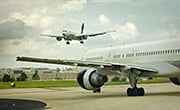
巴西政府提高巴西航空公司的外资所有权上限(英文版)
On March 2, 2016, the Brazilian federal government proposed a new rule—Medida Provisória n. 714/2016 ("MP 714")— which increased the existing 20 percent limit on foreign ownership in a Brazilian airline to 49 percent of the Brazilian airline's total voting capital.
Under the terms of MP 714, any ownership transfer up to the 49 percent limit is subject to the Brazilian Air Force Authority's prior approval. In addition, any reciprocal agreement executed with the Brazilian federal government is not subject to the 49 percent foreign ownership limit.
An increase in the foreign investment limit in Brazilian airlines has been widely discussed since 2009. The Brazilian government issued the new rule on an expedited basis in light of Brazil's deteriorating economic situation and its impact on the Brazilian airline industry, particularly due to the devaluation of the Brazilian real and a decrease in overall demand. January 2016 represented the sixth consecutive month of losses reported by Brazilian airlines.
A number of Brazilian airlines already have foreign partners. Delta Airlines owns approximately 9.5 percent of Gol Linhas Aéreas; TAM merged with the Chilean LAN Airlines, creating LATAM Airlines Group; and Azul Linhas Aéreas Brasileiras has the Chinese group HNA as a shareholder.
The new rule will not only permit current foreign shareholders in Brazilian airlines to increase their ownership stakes, but it also offers Brazilian airlines the opportunity to attract new investors and opens the Brazilian market to new partnerships between Brazilian and foreign airlines. This could make the Brazilian airline sector more competitive and lead to an increase in domestic flights, as well as expansion of international routes offered by Brazilian airlines.
According to the interim Minister of Civil Aviation, the Brazilian government is evaluating the possibility of issuing additional rules that would further increase the 49 percent cap on foreign ownership in Brazilian airlines.
Most governments limit foreign ownership of the airlines established in their countries. For example, the United States limits foreign ownership to 25 percent, and the European Union caps non-European ownership of EU airlines at 49 percent but is loosening these restrictions. Both labor interests (avoiding use of lower-cost labor from other countries) and national security concerns (use of domestic carriers for military purposes during wartime) have made governments reluctant to remove these limitations.
In Brazil, a Medida Provisória takes effect when published, but only on a temporary basis. In order to be permanently incorporated into the Brazilian legal framework, MP 714 must be approved by the Brazilian House of Representatives and the Brazilian Senate, where amendments may be proposed, and subsequently approved by Brazil's president.
We will follow up and report on any relevant updates or amendments to MP 714.





